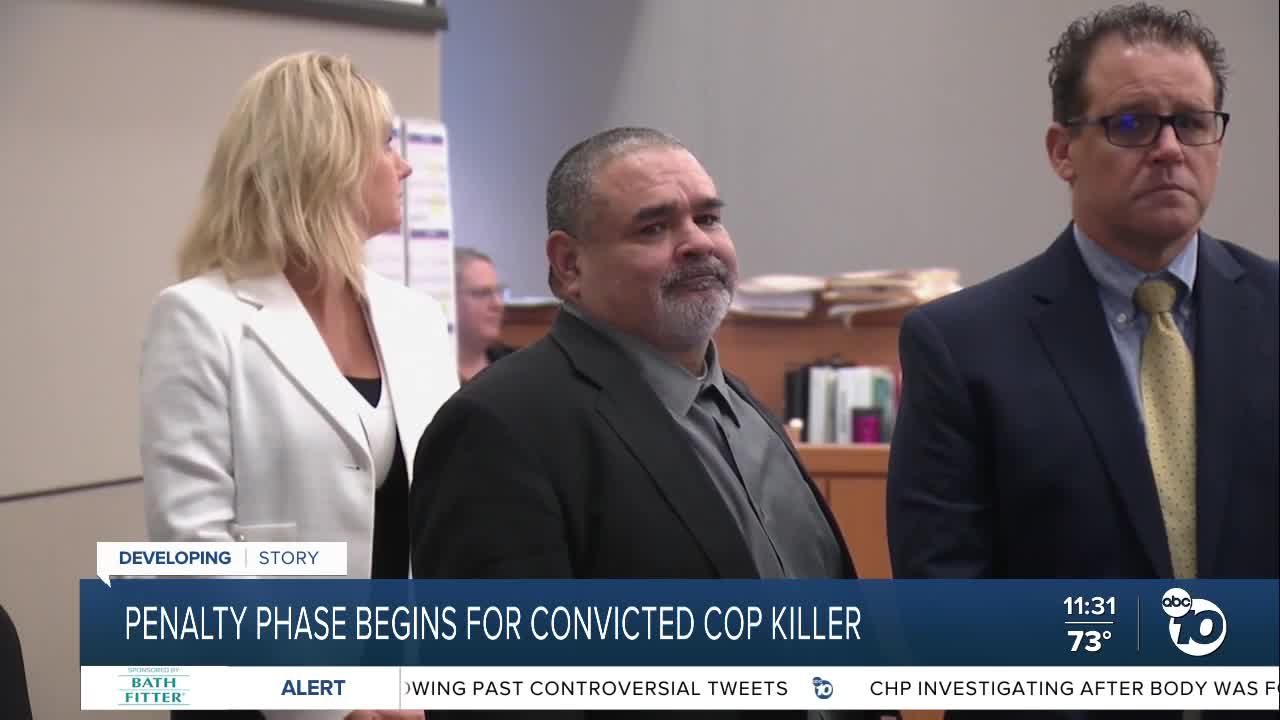SAN DIEGO (CNS) -- Jurors were asked Thursday to weigh whether a man convicted of shooting two San Diego police officers, killing one, should face the death penalty or life in prison without the possibility of parole.
Jesse Michael Gomez, 60, was found guilty Monday of first-degree murder for the July 28, 2016, shooting death of Jonathan "J.D." De Guzman, 43. In addition to murder, jurors also convicted Gomez of the attempted murder of De Guzman's partner, Wade Irwin, as well as being a felon in possession of a firearm.
The jury agreed with prosecutors that Gomez shot the officers in order to avoid another stint behind bars, while Gomez, who testified on his own behalf, said he thought the men approaching him in the street were gang members poised to kill him, and opened fire in fear for his life.
After Gomez shot the lawmen around 11 p.m. on Acacia Grove Way, De Guzman, a 16-year veteran of the San Diego Police Department, died shortly afterwards at a hospital, while Irwin was hospitalized for nearly a month for a gunshot to the throat.
In convicting Gomez of murder, the jury also found true a special- circumstance allegation of killing a police officer, opening him to a possible death sentence in the next phase of the trial, which began Thursday morning in a downtown San Diego courtroom.
While Gov. Gavin Newsom signed an executive order in 2019 placing a moratorium on capital punishment in California, the order, which will last for the remainder of his term in office, does not prevent prosecutors from seeking the death penalty.
Following Monday's guilty verdicts, jurors are now asked to decide whether the effects of the killing on the victim's loved ones, and the circumstances that defined Gomez's upbringing and life, warrant sentencing him to death or a lifetime of incarceration.
Deputy District Attorney Valerie Summers argued that Gomez had a history of violent conduct, in which he demonstrated that "time and time and time again, (Gomez) was ready, willing and able to use violence."
In outlining Gomez's first felony conviction for auto theft in 1983 and subsequent convictions for possessing guns and ammunition, the prosecutor said that over the course of more than three decades as a convicted felon, Gomez continued to arm himself with weapons and ammunition he was not authorized to carry.
"He continues on his bad course of conduct, culminating in the murder of Officer De Guzman and the attempted murder of Officer Wade Irwin," Summers said.
She said that after hearing testimony from De Guzman's family and friends, the jury will see "the terrible loss that this has caused" and conclude that death is "the appropriate punishment for a man who's old enough to know better, for a man who callously took the life of J.D. and tried to kill Wade."
Defense attorney Troy Britt, who implored jurors to exercise mercy, argued that Gomez's criminal history was not as severe as the prosecution alleged and said Gomez has not demonstrated violence or dangerousness during his prior incarcerations or the five years he has spent in jail pending this trial.
Britt spent much of his argument detailing Gomez's tumultuous upbringing, which the attorney said was defined by trauma and pervasive drug addiction.
Despite the abuse and neglect he experienced growing up, Britt said Gomez became a loving, caring husband and father, but his addiction always prevailed in keeping him from attaining any kind of stability in life.
At the end of the penalty phase, Britt said the jury would see that "Mr. Gomez is not the worst of the worst."



